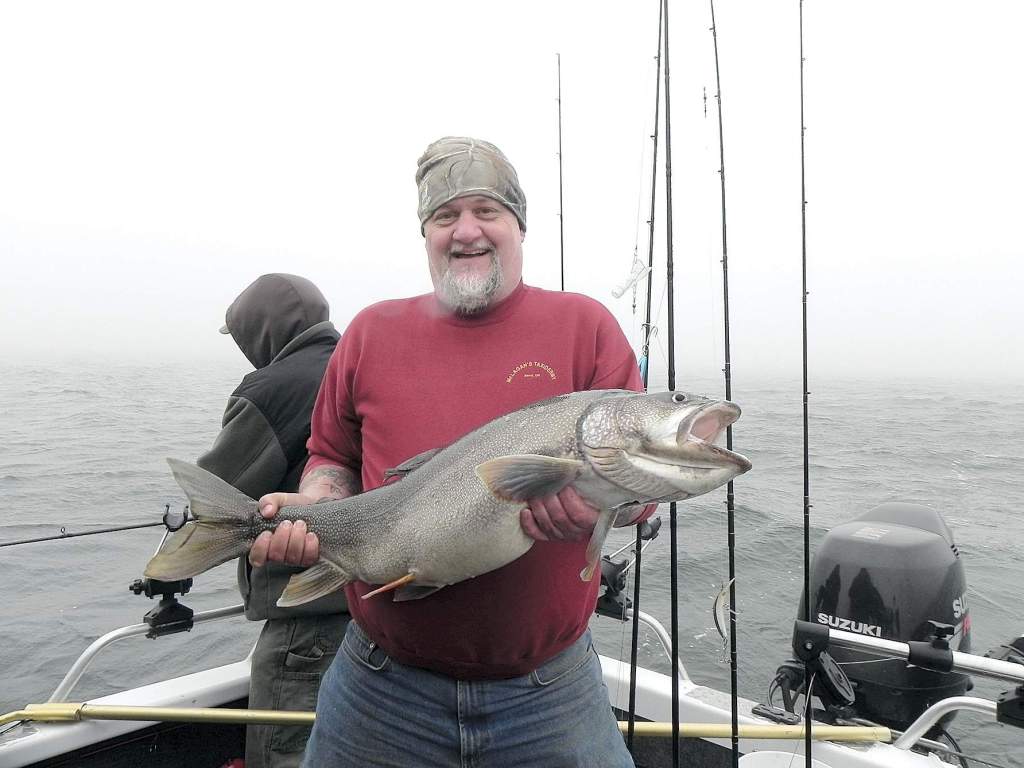Fishing Odell Lake
Published 5:00 am Thursday, May 26, 2011

- Tim McLagan, of Bend, landed this lake trout during Odell Lake's mackinaw derby last week.
In the afternoon, the fog rolled in and the wind that blew over the top of the Cascades funneled down between the Cascade Summit and Maklaks Mountain and pushed up the waves. Only the north shore was visible below the clouds.
At that moment, my 9-pound, 9-ounce mackinaw held ninth place in the Odell Lake Lodge and Resort’s annual Mac Derby. Bob Bennett’s 11-pound, 9-ouncer was in sixth place. In the lead was a 21-pound, 11-ounce mackinaw.
With 10 places in the derby, we had a good chance to finish in the money if the action would slow down a little bit.
Although there had been a lot of fish caught over the past few days between 25 feet and 45 feet deep, we were picking up our lake trout between 100 and 120 feet deep.
When the tip of his rod began to tremble, Tim McLagan grabbed it out of the rod holder and popped the line out of the downrigger clip. He brought the fish up slowly to prevent it from bursting its air bladder on the way up. A 25-incher — McLagan released it.
We made another turn to follow the course that had paid off with our past two bites. Robert Troy dropped his downrigger ball back down to 120 feet, with the other line clipped off at 90 feet.
Behind the boat, a long way down, our J-Plugs did their work. They wobbled and rattled while we watched the depth finder and tried to run the baits up the slopes of the submerged canyons and back down again. From time to time, Bob called out the depths of fish marked on the screen. “There’s one at 48 feet, another at 67 feet.”
It was 3:45 when the rod shivered in its holder and the line popped off the clip. Robert Troy grabbed the rod. About 120 feet down, a big fish shook his head and the battle was joined. Line burned off the reel as the fish arced away from the boat. Troy pumped it up, then reeled down. Five minutes later, the fish made its last run when it saw the boat. On the next pass, it went headfirst, thrashing into the net.
I dialed Jon Ditgen while Troy kept his netted fish in the water. In a few minutes, Ditgen’s boat showed through the fog. When the boat was alongside, Troy handed the net over. The big fish pulled the scale to 15 pounds. I did the math.
My fish had dropped back to 10th place. Anything bigger than 10 pounds would bump my mack into 11th and out of the derby.
At the pre-derby angler meeting, Ditgen promoted a catch-and-release ethic. With cell phones or radios, the angler can call for a check of the catch, then the fish can be released if the angler doesn’t want to keep it.
In the course of the day, when Ditgen gets a call, he gets a direction and description of the boat and heads across the lake to weigh and measure and watch the angler release the fish, back to deep water.
A hundred feet down, a J-Plug wiggled its temptation. It dug, it shimmied, it rattled, the tip of the rod pulsed and the downrigger cable hummed in the wind. We had an hour and a half left until the 6 o’clock horn and the end of the day’s fishing when the rod tip plunged toward the water and the line pulled away from the downrigger clip.
Line blistered off the reel. The big lake trout wallowed and Tim gained line before the fish ran again. Five head-shaking, arm-wrenching minutes later, the fish was alongside the boat. “I don’t know why some people say these fish don’t fight,” Tim said.
Jon Ditgen’s boat showed through the fog. Tim’s trophy pulled the scale to 18 pounds, 3 ounces for second place in the derby. That booted me and my fish out of contention. The next day, an even bigger mackinaw was brought to the net, which pushed Tim’s lake trout back to third place for the finish, Robert Troy’s to eighth place and Bob Bennett’s into never-never land.
Sunday afternoon, at the awards ceremony, Ole Hanson’s fish, at 21 pounds, 11 ounces, placed first. David Davey weighed in with an 18-pound, 8-ounce lake trout and Tim McLagan’s fish took third.
Odell’s lake trout fishery was established by stocking efforts in the early 1900s, and Oregon’s current state record laker was caught in Odell in 1984. That fish tipped the scales at 40 pounds, 8 ounces. Most of the fish run between 5 and 15 pounds, but the Oregon Department of Fish and Wildlife has recorded lake trout in the 50-pound range. Fishermen come from all over the Northwest for the chance at boating one. Anytime between the first of May and the end of October, any angler on the lake has a good chance at the new state record.





